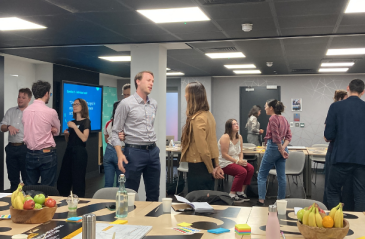
Embracing AI: Empowering vulnerable workers for a more inclusive future

Data science and digital technologies are on the move – how do they affect government?
Share articleIt's vital to know what is and what isn’t possible through data science, says @New_To_Dave
Share articleAI requires greater data literacy – among both citizens and civil servants, says @ZeynepEngin
Share articleWe put our vision for government into practice through learning partner projects that align with our values and help reimagine government so that it works for everyone.
How does the evolving world of data science and digital technologies affect government? We checked in with some digital leaders to find out...
Deputy Director, Data Science Campus, UK's Office for National Statistics
There are two main aspects for the use of data science in policy. The first is helping policymakers as informed a decision as possible - they need to understand as many sources of data as possible and the key aspect of data science is connecting these data sources to extract meaningful information in a way that just one source of data would not be able to provide. The second is helping assess the impact of policy - so it's not just helping inform policy decisions, is it helping do an impact assessment and, potentially for policymakers, gauging public opinion into the impact as well.
But it's important to know what is and, more importantly, what isn't possible through data science. When you're introducing data science into government you first have to overcome a lack of understanding about what it can bring to a conversation. Then, once policymakers have an appetite for data science they may come to believe it can be used to overcome all problems. But once you understand what its limitations are then I think you avoid some of the danger zones when you hear concepts like ‘government by algorithm'.
But if artificial intelligence (AI) is used for operational efficiencies and sense-checking existing processes then it would be quite useful. But my personal opinion is that we should be cautious about removing the human element all together from anything that impacts on individuals.
Founder, Data for Policy; Senior research associate, Urban Dynamics Laboratory, University College London
When we talk about data science and digital technologies it is really a different world that we're moving into - and this is something that government cannot avoid. The traditional hierarchical system is being rendered out of date by these advances.
When we talk about ‘data science' it is really the emerging technologies such as artificial intelligence (AI) and Blockchain, the Internet of Things, predictive analytics and so on. These technologies can bring greater efficiency and precision but there are also some obvious drawbacks. There are privacy and ethical issues about how all this data is going to be processed. And in a policymaking environment there is also the transparency issue as people really need to know what is happening and who is accountable for the decisions that are made. So, there are all sorts of issues with data science and the associated technologies that have to be addressed.
When we look at AI specifically there are definitely some practical ways in which it can help government. It can help improve civil service efficiency and support civil servants with more reliable evidence, as well as with new information that they couldn't source by themselves. Citizens, too, stand to benefit as AI can help them become more involved in decision-making processes. But this requires a greater level of data literacy - among both citizens and civil servants. Government leaders should prioritise educating them, as well as the next generation, about how these new programmes and technologies are developed.
Leverhulme Early Career Fellow, Department of Computer Science and Technology, University of Cambridge
Digital government is also digital infrastructure. Providing people with infrastructure that fits what they need - whether that's privacy, control of their data or access to digital services. This also involves choice, because it is important we have choice in the digital economy. You can make your own choice by choosing where your data is stored and the privacy policies that apply, taking into account the risks that you are taking. For example, you may choose to store your data in one of the larger clouds, if you have reasonable confidence that they have the necessary security in place. But I don't know if you necessarily can feel the same way when your data is stored by a certain application in an unknown cloud.
When it comes to government's role on data science, I think that it should provide more funding for independent research. Right now, we receive support from industrial collaborators. But when you're funded by an industrial collaborator you don't have an incentive to come up with ideas that might go against the sponsor. Better engagement between policy makers and academia and more blue-sky funding opportunities are vital.
In the long term, it is also important to encourage moves to increase privacy, and increase data control. I believe it is also important to think about resilience. For example, if we have data centres, many of which reside in the EU due to a lack of suitable space in the UK, government could think about other novel solutions, such as distributed data centres. There could also be closer integration between software and hardware solutions. Software can't scalably perform without hardware support.
The Centre for Public Impact is investigating the way in which artificial intelligence can improve outcomes for citizens.
Are you working in government and interested in how AI applies to your practice? Or are you are an AI practitioner who thinks your tools can have an application in government? If so, please get in touch.












